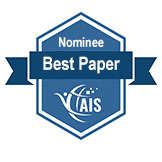Loading...
Paper Type
ERF
Abstract
In our digital age creativity is important to all kind of organizations. In Information Systems (IS) research Creativity Support Systems (CSS) have a long history. However, findings are various and not overwhelming. In this emergent research forum-paper, we want to contribute to existing literature of CSS and cognitive science by using a design-oriented approach to develop a roadmap to a concept of a CSS using AI and different design variants and propose further steps on how to evaluate the derived design variants (i.e., continuum from highly realistic representations to abstract representation of visual stimuli). The kernel theory is based on the Cognitive Network Model (CNM) and the fixation literature. Our work shows how to build the CSS and how to evaluate the system in a two step approach. The first part of the evaluation will be a qualitative ex ante evaluation in order to inform the subsequent post ante laboratory experiment.
Recommended Citation
Klein, Hans Christian; Oschinsky, Frederike Marie; Weber, Sebastian; Kordyaka, Bastian; and Niehaves, Bjoern, "Beyond the Obvious – Towards a Creativity Support System using AI-driven Inspiration" (2020). AMCIS 2020 Proceedings. 7.
https://aisel.aisnet.org/amcis2020/cognitive_in_is/cognitive_in_is/7
Beyond the Obvious – Towards a Creativity Support System using AI-driven Inspiration
In our digital age creativity is important to all kind of organizations. In Information Systems (IS) research Creativity Support Systems (CSS) have a long history. However, findings are various and not overwhelming. In this emergent research forum-paper, we want to contribute to existing literature of CSS and cognitive science by using a design-oriented approach to develop a roadmap to a concept of a CSS using AI and different design variants and propose further steps on how to evaluate the derived design variants (i.e., continuum from highly realistic representations to abstract representation of visual stimuli). The kernel theory is based on the Cognitive Network Model (CNM) and the fixation literature. Our work shows how to build the CSS and how to evaluate the system in a two step approach. The first part of the evaluation will be a qualitative ex ante evaluation in order to inform the subsequent post ante laboratory experiment.
When commenting on articles, please be friendly, welcoming, respectful and abide by the AIS eLibrary Discussion Thread Code of Conduct posted here.



